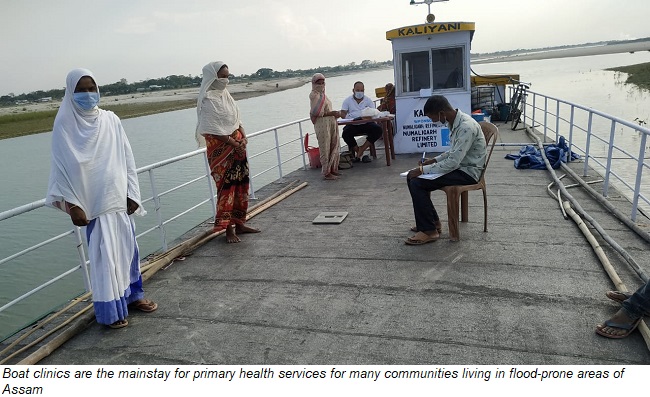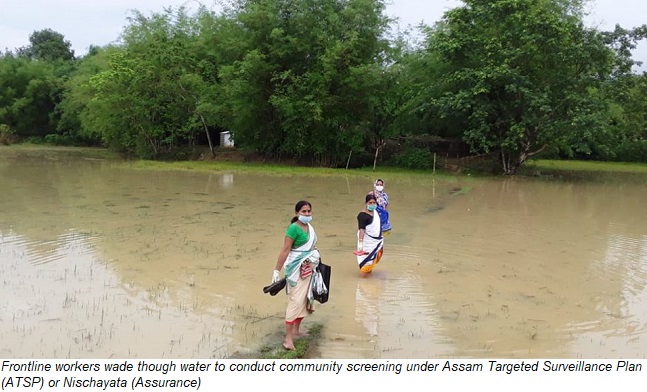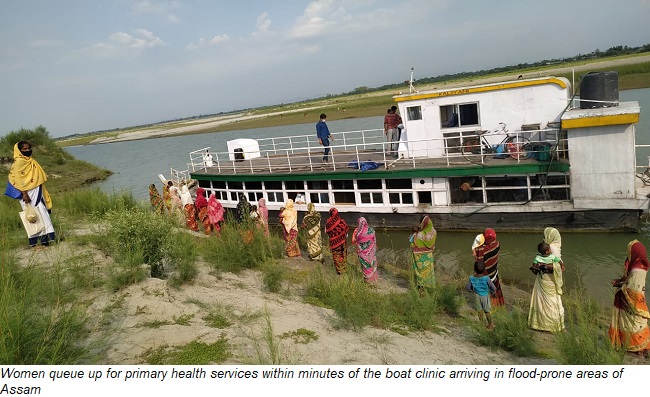The state of Assam in North-East India amalgamated testing, tracing and treatment with strengthening its strong primary health centres (PHC) to ensure COVID-19 pandemic response services reached everyone in the state, including communities in difficult-to-reach areas.
In a state where 39.6 % of the area is prone to floods, according to Rastriya Barh Ayog in the Department of Water Resources, Government of Assam, large tracts of land are unreachable for many months during the year, which makes providing health care services a huge challenge.

When Covid-19 cases began rising after the easing of the nationwide lockdown on 17 May 2020, Assam rapidly scaled up testing, tracing and treatment by launching the Assam Community Surveillance Plan (ACSP) to conduct active community surveillance to identify fever and SARI (Severe Acute Respiratory Infections) and ILI (Influenza like Illness). Under this “COVID-19 plus” campaign, health workers visited door-to-door to screen people at high risk for teams to test the following day.
The surveillance found cases rising among people with no travel history or contact with a COVID-19 positive case among workers in vulnerable sites, such as interstate truck/bus terminals, dhabas (small roadside eateries), petrol pumps, hotels, garages, and police and health staff. To contain infection among this high-risk population with aggressive testing potential hotspots such as transport hubs, markets, interstate truck and bus terminals, and parking lots, the state launched ACSP 2.0 as Assam Targeted Surveillance Plan (ATSP) or Nischayata (Assurance).

Under ATSP, all arrivals to the state were tested for COVID-19, and those who tested negative were asked to observe strict home quarantine for 14-days. Those diagnosed with COVID-19 were isolated in dedicated COVID-19 hospitals. This policy proved effective, with majority of new cases being reported from quarantine centres.
WHO field teams supported community and targeted surveillance programmes by guiding COVID-19 response activities in flooded areas and remote tea gardens, and assisting in data management and field reviews of infection prevention and control in COVID care hospitals. Other areas of support included activating a strong primary health care network for surveillance, strict quarantine and effective case management, which contributed to improved recovery rates.
“WHO has been continuously extending technical assistance to roll out different health programmes in Assam to strengthen the health system and to realize the goals of UHC. Since the beginning of the COVID-19 pandemic, WHO has been supporting state in different health initiatives to deliver quality healthcare services. The timely support of WHO has proved highly useful for state,” said Dr Dipjyoti Deka, State Programme Manager, National Health Mission, Assam.

The WHO field teams have also been guiding the state government in the resumption and continuation of essential services in Immunization, vaccine-preventable disease surveillance, TB elimination, and comprehensive primary care with the state.
